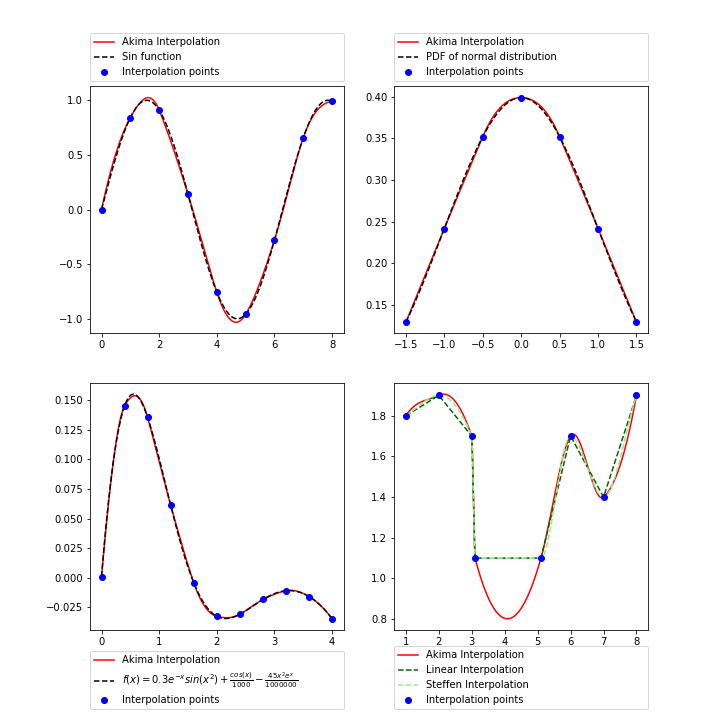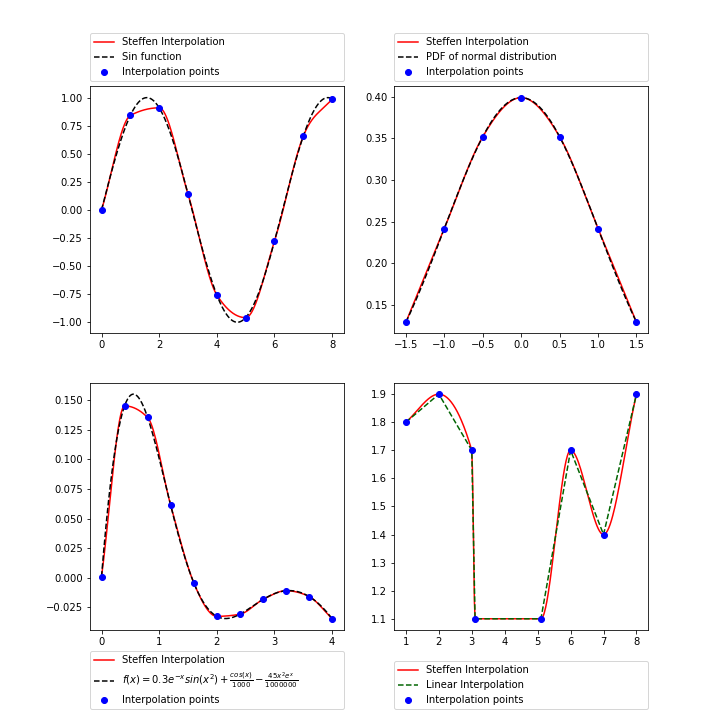interpolationExample.cpp
Programme generates the data used to plot the examples of interpolation schemes. Programme generates the csv files containing data used to plot the examples of interpolation schemes:
- sin function
- normal distribution PDF
- function defined by formula:

- discrete set of points (example taken from [45])

| 
|
Plot aboves presents the output for AKIMA and Steffen interpolation scheme. THe plots can be generated using python script: interpolationExample.py
#include <juliant.hpp>
using namespace julian;
class InterpolationPlot {
public:
InterpolationPlot(std::string name): name_(name) {}
InterpolationPlot(std::string name, std::vector<double> x, std::vector<double> y): name_(name), x_(x), y_(y) {}
DataFrame res;
for (double t = x_.front(); t <= x_.back(); t += step) {
DataEntryClerk input;
input.add("x", t);
input.add("y", inter->operator()(x_, y_, t));
res.append(input);
}
return res;
}
DataFrame interpolationPoints() {
DataFrame res;
for (unsigned int i = 0; i < x_.size(); i++) {
DataEntryClerk input;
input.add("Sample",name_);
input.add("x", x_[i]);
input.add("y", y_[i]);
res.append(input);
}
return res;
}
protected:
std::string name_;
std::vector<double> x_;
std::vector<double> y_;
};
template<typename F>
class InterpolationPlotWithFunc : public InterpolationPlot {
public:
InterpolationPlotWithFunc(){};
InterpolationPlotWithFunc(F f, std::string name, double start, double end, double step):
InterpolationPlot::InterpolationPlot(name), f_(f) {
for (double t = start; t<= end; t+= step) {
x_.push_back(t);
y_.push_back(f(t));
}
}
DataFrame originalFunction(double step) {
DataFrame df;
for (double t = x_.front(); t<= x_.back(); t+= step) {
DataEntryClerk input;
input.add("Sample", name_);
input.add("x", t);
input.add("y", f_(t));
df.append(input);
}
return df;
}
private:
F f_;
};
int main() {
//
// Creating example functions that will be used to generate interpolation points
//
auto func = [](double x)->double{ return 0.3*exp(-x) * sin(x*2) + 0.001*cos(x) - 0.000045*exp(x) * x * x;};
auto sinus = [](double x)->double{ return std::sin(x);};
InterpolationPlotWithFunc<decltype(func)> func_test(func, "custom", 0.0, 4.0, 0.4);
InterpolationPlotWithFunc<decltype(sinus)> func_sin(sinus, "sin" , 0.0, 8.0, 1.0);
InterpolationPlotWithFunc<decltype(norm)> func_norm(norm, "norm" ,-1.5, 1.5, 0.5);
//
// We also define discrete set of points that will be used in interpolation
//
std::vector<double> x {1.0, 2.0, 3.0, 3.1, 5.1, 6.0, 7.0, 8.0};
std::vector<double> y {1.8, 1.9, 1.7, 1.1, 1.1, 1.7, 1.4, 1.9};
InterpolationPlot custom_points("points", x, y);
//
// Saving interpolated points into csv file
//
DataFrame interpolation_points;
interpolation_points.append(func_test.interpolationPoints());
interpolation_points.append(func_sin.interpolationPoints());
interpolation_points.append(func_norm.interpolationPoints());
interpolation_points.append(custom_points.interpolationPoints());
//
// Saving original function (sampled with step 1e-2) into csv file
//
DataFrame original_functions;
original_functions.append(func_test.originalFunction(0.01));
original_functions.append(func_sin.originalFunction(0.01));
original_functions.append(func_norm.originalFunction(0.01));
//
// Defining interpolations
//
std::map<std::string, SmartPointer<Interpolation> > interpolations;
//
// Gemerating interpolant for each interpolation methods and sample points
//
for (auto p : interpolations) {
DataFrame results;
results.append(func_test.interpolation(p.second, 0.02));
results.append(func_sin.interpolation(p.second, 0.02));
results.append(func_norm.interpolation(p.second, 0.02));
results.append(custom_points.interpolation(p.second, 0.02));
}
}


 1.8.11
1.8.11